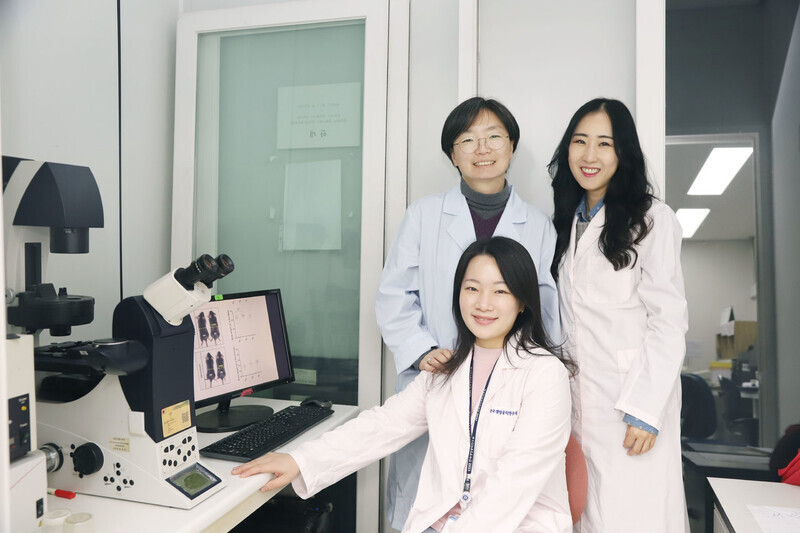hankyoreh
Links to other country sites 다른 나라 사이트 링크
Korean research team finds potential link between nanoplastics, obesity

A team of Korean researchers has become the first to learn that nanoplastics change the composition of breast milk.
The Korea Research Institute of Bioscience and Biotechnology announced Thursday that a team of researchers under Lee Da-yong from the Rare Disease Research Center have demonstrated that these tiny plastics smaller than microplastics can change the composition of fats in breast milk, potentially causing an abnormal increase in body weight in succeeding generations.
Microplastics, or tiny pieces of plastic waste measuring from 5 millimeters to 1 micrometer in diameter, are understood to cause various environmental issues when they enter rivers and the ocean.
Microplastics can break down even further into nanoplastics, which have a diameter of less than 1 micrometer, equivalent to 0.001 millimeters. But particles of that size are nearly impossible to detect or observe.
In the latest research, Lee and the other researchers fed pregnant laboratory mice with polystyrene and polypropylene (types of plastic used to make packaging material and tableware) and then observed their progeny after birth.
The baby mice weighed more than those in the control group in the first week and in the third week even though there was no increase in their food consumption or growth hormone secretion. The rats exhibited a marked increase both in their body fat volume and body fat ratio, and there was also a significant increase in their blood cholesterol level.
The research term detected abnormal changes in the composition of lipid metabolites in the mother mice’s breast milk, including a notable increase in lysophosphatidylcholine, which is highly correlated to obesity. Similar changes also occurred in the blood of the baby rats that nursed on that breast milk.
When the researchers examined the mice’s gut microbiome and ecosystem, they found a marked decrease in the types of microorganisms that are known to inhibit obesity.
This research followed up on a study called “Maternal exposure to polystyrene nanoplastics causes brain abnormalities in progeny” that Lee helped publish in 2021.
“We initiated this study because we’d found that weight continued to increase in the progeny [of the research subjects]. In the future, we think this may serve as scientific evidence needed to justify government initiatives to address the issue of microplastic pollution,” Lee said while the team’s research was still underway.
This study was published on Feb. 29 in the online edition of Environment International, a major academic journal in the environmental field.
By Park Ki-yong, staff reporter
Please direct questions or comments to [english@hani.co.kr]

Editorial・opinion
![[Column] Season 2 of special prosecutor probe may be coming to Korea soon [Column] Season 2 of special prosecutor probe may be coming to Korea soon](https://flexible.img.hani.co.kr/flexible/normal/500/300/imgdb/original/2024/0426/3317141030699447.jpg) [Column] Season 2 of special prosecutor probe may be coming to Korea soon
[Column] Season 2 of special prosecutor probe may be coming to Korea soon![[Column] Park Geun-hye déjà vu in Yoon Suk-yeol [Column] Park Geun-hye déjà vu in Yoon Suk-yeol](https://flexible.img.hani.co.kr/flexible/normal/500/300/imgdb/original/2024/0424/651713945113788.jpg) [Column] Park Geun-hye déjà vu in Yoon Suk-yeol
[Column] Park Geun-hye déjà vu in Yoon Suk-yeol- [Editorial] New weight of N. Korea’s nuclear threats makes dialogue all the more urgent
- [Guest essay] The real reason Korea’s new right wants to dub Rhee a founding father
- [Column] ‘Choson’: Is it time we start referring to N. Korea in its own terms?
- [Editorial] Japan’s rewriting of history with Korea has gone too far
- [Column] The president’s questionable capacity for dialogue
- [Column] Are chaebol firms just pizza pies for families to divvy up as they please?
- [Column] Has Korea, too, crossed the Rubicon on China?
- [Correspondent’s column] In Japan’s alliance with US, echoes of its past alliances with UK
Most viewed articles
- 1AI is catching up with humans at a ‘shocking’ rate
- 2After election rout, Yoon’s left with 3 choices for dealing with the opposition
- 3Is Japan about to snatch control of Line messenger from Korea’s Naver?
- 4South Korea officially an aged society just 17 years after becoming aging society
- 51 in 5 unwed Korean women want child-free life, study shows
- 6[Column] ‘Choson’: Is it time we start referring to N. Korea in its own terms?
- 7Korea’s 1.3% growth in Q1 signals ‘textbook’ return to growth, says government
- 8No good, very bad game for Korea puts it out of Olympics for first time since 1988
- 9[Editorial] Japan’s rewriting of history with Korea has gone too far
- 10Why Korea shouldn’t welcome Japan’s newly beefed up defense cooperation with US